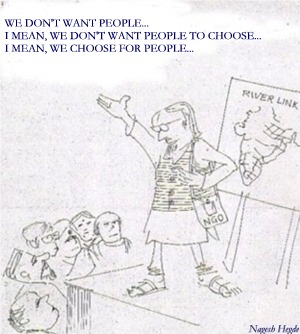The dominant economic and social themes of the day attract considerable partisanship and adversarial engagements. Organized groups (e.g. trade unions and farmers' associations), associations working for the unorganized as well as individuals have many causes that they advocate in various ways, and many demands to make of the ruling parties at the state and federal levels.

These demands have their origins both in the times and in the nature of our society. India is chaotically shedding the centrally planned economy of old, only to find that the unregulated one leaves millions of people simply unprepared to tackle the rapid changes around them and looking to government to provide various means of protection. A considerable fraction of the population, moreover, has endured centuries of various biases and injustice, and is only now discovering the possibility of state-led reform. Together these developments bring great expectations to the doors of governance, often expressed in strong words and actions.
The state, however, isn't often responsive; the political elite remain mostly unaccountable to the voters, and sometimes outright opposed to their interest, resulting in cynicism and distrust of all politics. In public-interest camps these feelings run especially deep; worse still, the feeling is often mutual. Inside the corridors of power, non-governmental organizations are rarely seen as agents of positive change working with the government; instead New Delhi and the state capitals are suspicious of development organizations.
Advocacy is important, and informed advocacy is irreplaceable, but at the heart of the democracy lies informed choice, and every advocating group's first priority must be to inform citizens on the range of choices available to them. But in seeking to implant their own 'superior' judgement of the public good, they often mimic the very politicians they disdain. A second failing is this - many advocating groups forget that representing the public interest on behalf of others is legally and politically different from the representations that marginalized groups themselves make and the methods they may adopt, often to obtain their rights. Advocacy groups who ignore this distinction overstep their roles.
Development advocacy does not always heed these caveats, but it must. Individuals and organizations must seek more than the acceptance of their immediate arguments in specific policies. The import of hazardous waste into India, the enslavement of millions of children in labour and the lack of policy priorities for living wages, to cite only a few examples, certainly need to be addressed, but not by a diktat of decency alone. The solutions lie not in merely overturning what is obviously bad, but in ensuring that informed choices are made by citizens who themselves arrive at the answers. The public interest lies not in deciding on behalf of the larger citizenry, but in the opportunity for citizens to make each of the many choices.
Take this simple example - the proposal to interlink rivers has recently been rejuvenated, and is an idea that attracts much popular opinion as well. It has the support of the government and industry, with only a few exceptions. But there is opposition too - from economists trashing its financial viability, from human rights groups who fear displacement and inadequate compensation, and from environmentalists warning of massive side-effects and externalization of costs that are likely. This is not unlike many infrastructure projects in India today.
Given all this, what should the path of public-interest advocacy be in these circumstances?
Opposition from the environmentalist and the health worker is to expected, and the machinery of quieting it is extremely well-oiled. Second, the economic insecurity of the advocates themselves can often be exploited - with a little patience many of the protestors can be forced into an inertial and dejected silence. Even more importantly, these different points of opposition usually emerge from different quarters, and can be dealt with separately. The operational details of all decision-making eventually meet the partisan positions anyway - and every politician knows this, and has usually mastered the science of wielding this knowledge to advantage.
While the fine print of decision-making in governance usually weighs against the public interest, that need not be. Opportunities for meaningful counter-moves have nonetheless existed and continue to. To leverage these, advocates of the public good must focus their arguments on citizenship, and not opinion. They must present not only the academic reasoning of their alternate views - this they already do - but also ask that the decisions themselves be popularly endorsed by the public. The citizen is the only individual in whom the different points of advocacy converge; decisions made without her participation, however well intended, cannot be additive to democracy.
Acknowledging this requires both humility and intellectual honesty among the Samaritans. Public interest camps must hold themselves accountable for outcomes in the governance and citizen participation processes themselves, not merely for their advocacy. For this, there must be the recognition that our advocacy cannot displace or deter responsible citizens' own participation. We cannot become so convinced of the righteousness of our positions that we ourselves forget to seek their endorsement by citizens, and in doing so permit easy deflection of the public good by politicians.
Sound advocacy isn't just a different partisan opinion from that of the ruling party; it should be the recognition of the citizen's irreplaceable role in a free society. Good intentions that merely begin and end with a bow to this truth aren't good at all; they merely replace one set of know-it-all decision-makers with another that claims more benevolence, is no less partisan and no more successful.























